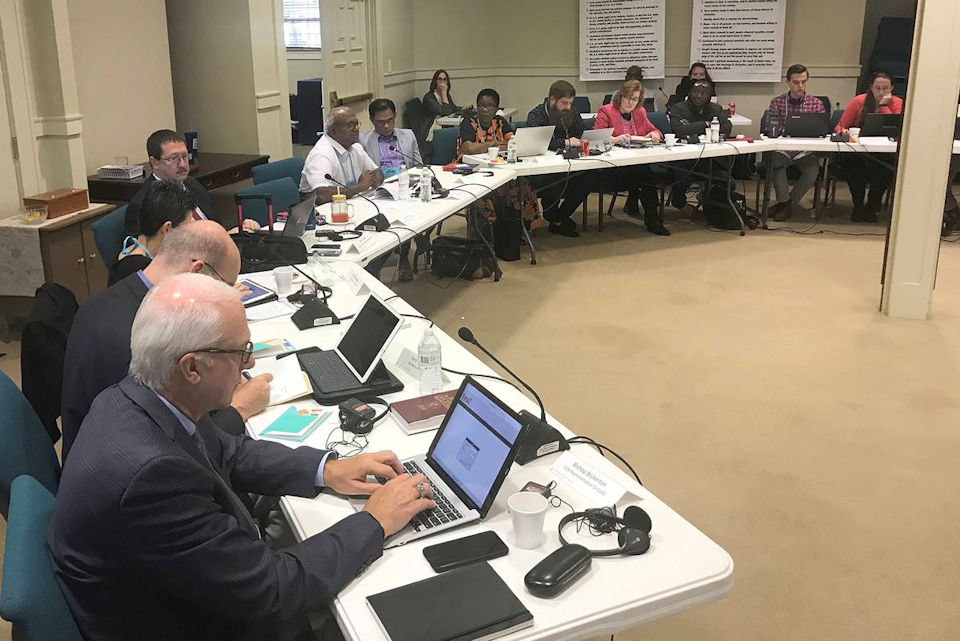The probe into the integrity of the voting process — the number of voting delegates and eligibility for voting — continues by the bishops, financial leadership, and the Judicial Council of The United Methodist Church.
HEATHER HAHN
UM News
Both The United Methodist Church’s bishops and finance agency are taking action in response to the investigation that found fraudulent voting at General Conference 2019.
The Commission on General Conference — the group that organizes the denomination’s multinational legislative assembly — announced Aug. 10 that four ineligible people cast votes using the credentials of absent delegates.
The investigation into voting irregularities unearthed other concerns that the commission referred to the denomination’s Council of Bishops and General Council on Finance and Administration.
With the next scheduled General Conference fast approaching, the bishops said they take the concerns seriously.
“The best work of the delegates in the upcoming 2020 General Conference depends on the integrity of the voting process and the transparent oversight of our conferencing,” the bishops said in a statement released late Aug. 15. Bishops do not have a vote at General Conference but act as presiders during plenary sessions.
The commission determined that enough improper voting took place to invalidate a key vote that substantially revised legislation to allow congregations to leave with property.
The commission wants the denomination’s top court, the Judicial Council, to decide what the invalid votes mean for the legality of the subsequently adopted full legislation. To ask the church court to weigh in, the commission determined the Council of Bishops should be the group that made the request.
The bishops agreed to ask the Judicial Council for a declaratory decision “on the implications of the illegal votes on the disaffiliation petition.”
The Judicial Council already has announced its docket for its next meeting on Oct. 29-Nov. 1 in Evanston, Illinois. It is up to the church court to decide whether or when to schedule the bishops’ request.
The Council of Bishops responded to two other commission requests:
- To do further investigation of allegations related to delegate selection.
- To collaborate with the General Council on Finance and Administration in discussing the membership statistics used in calculating how many delegates each annual conference can send to General Conference.
The bishops said they are naming two small working groups to fulfill this request.
The General Council on Finance and Administration board reported during a teleconference meeting Aug. 15 that the agency also would work with the bishops and the commission on the request related to membership.
In the meantime, the agency also plans to post on its website how membership data is collected, the purpose it serves, the years and sources used for calculations and what the Book of Discipline, the denomination’s policy book, says about data collection. The agency also will list the training it has already conducted around the globe on data collection.
Sharon Dean, chief communications officer, said the finance agency hopes to have that information up by the end of the week.
Membership data has faced increased scrutiny since the high-stakes 2019 special General Conference that dealt with the denomination’s longtime debate over the status of LGBTQ individuals. By a 438-384 margin, the denomination’s top lawmaking body adopted the Traditional Plan that adds enforcement measures to bans on same-sex weddings and “self-avowed practicing” gay clergy.
A formula that uses each annual conference’s number of professing members and clergy helps determine its number of General Conference delegates. Membership data is also used in determining how many bishops a region has. But for various reasons, including infrastructure challenges, the membership data available can be out of date and unreliable.
Ken Ow, a finance agency board member, said during the teleconference that one concern has been a lack of uniformity in the collection of professing membership data across the denomination.
Rick King, the agency’s chief financial officer, said the agency has been training statisticians and other conference staff in membership collections. But he added that trying to validate all the data “could become very costly.”
The Rev. Gary Graves, the secretary of General Conference, already has calculated the size of the 2020 General Conference delegations using annual conference journals. Most of the 862 delegates are already elected.
Last Updated on November 1, 2023

